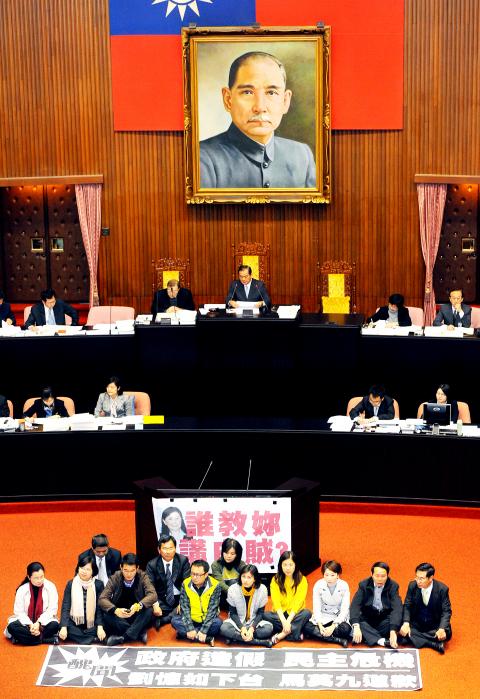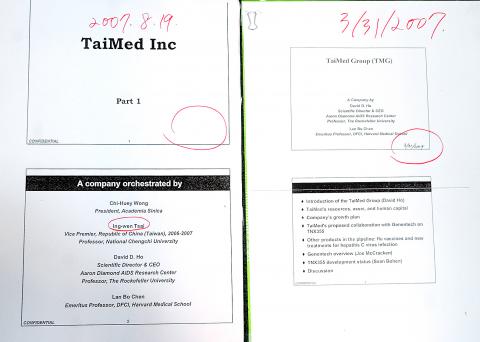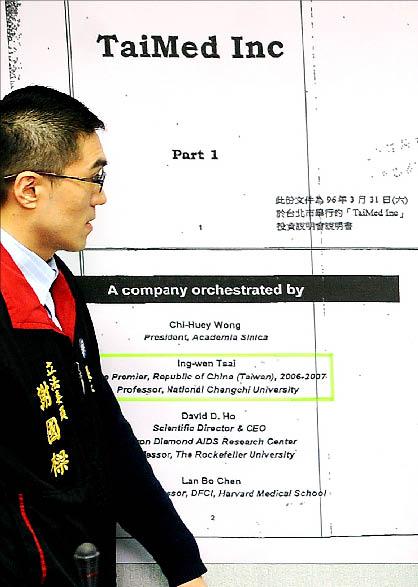Council for Economic Planning and Development (CEPD) Minister Christina Liu (劉憶如) yesterday apologized for confusing the date of a file on the formation of a biotech company allegedly involving Democratic Progressive Party (DPP) presidential candidate Tsai Ing-wen (蔡英文).
However, Liu said she would not apologize “for forgery” as the DPP demanded because the accusation was not true, even though the DPP has warned it would sue Liu if she did not issue an official apology by noon today.
“So sue [me],” Liu said. “A straight shooter would not be afraid of being sued by anyone.”

Photo: Wang Min-wei, Taipei Times
The DPP demanded a formal apology from Liu and the Chinese Nationalist Party (KMT) before noon today for accusing Tsai of wrongdoing in connection with Yu Chang Biologics Co (宇昌生技股份有限公司) while Tsai was the vice premier in 2007.
At a press conference yesterday morning, DPP officials showed two presentation documents which they said proved that Liu and the KMT had used inaccurate information to mislead the public on Monday. The DPP then demanded that Liu apologize before 3pm yesterday or else it would consider filing a lawsuit against her for document forgery and violating the Presidential and Vice Presidential Election and Recall Act (總統副總統選舉罷免法).
At the Monday press conference, Liu and the KMT displayed a document that they said was distributed by the TaiMed Group (TMG), the predecessor of Yu Chang, at an investor conference on March 31, 2007, and said the presentation document listed Tsai as one of the four principal leaders of the start-up.

Photo: Wang Min-wei, Taipei Times
Liu had not issued an official statement of apology when the DPP held a second press conference, during which DPP spokesperson Chen Chi-mai (陳其邁) demanded that Liu and KMT legislators Chiu Yi (邱毅), Hsieh Kuo-liang (謝國樑) and Lin Yi-shih (林益世) formally apologize to Tsai before noon today.
“Liu must also explain why she cited a fabricated document to make an accusation and tell us who was behind the scenes orchestrating this plot,” Chen said, reiterating that the party had not ruled out filing a lawsuit against Liu, KMT officials and KMT legislators over the “smear campaign.”
At the morning press conference, Chen said Liu and the KMT might have committed forgery and may have violated Article 90 of the election act, which stipulates that anyone who spreads a rumor or false statement for the purpose of getting a candidate elected or impeding a person’s election chances could be sentenced to a fixed term of imprisonment of up to five years.

Photo: Chu Pei-hsiung, Taipei Times
The document shown by Liu on Monday was actually a TaiMed Group presentation from Aug. 19, 2007, less than two weeks before the founding of Yu Chang on Sept. 5, Chen said, adding that Tsai’s name had been listed because she was a chairman-to-be after stepping down as vice premier in May.
That was why Tsai was listed as “Vice Premier of the ROC, 2006-2007” on the document, Chen said.
However, the KMT placed additional information on the document copies provided to the media that indicated it had come from the March investor conference, Chen said.
The presentation materials used in the March investor conference only listed the names of three scientists as TMG’s leaders, Chen said, adding that Tsai was not listed because she was still vice premier at the time.
DPP spokesperson Chuang Ruei-hsiung (莊瑞雄) slammed the KMT for launching a “smear campaign,” calling the effort “a trilogy of so-called whistle-blowing, intensive media scrutiny and judicial oppression.”
“By using false information in a press conference held at the Legislative Yuan, the KMT caused great harm to Tsai,” Chuang said.
At a separate setting, DPP Legislator Kuan Bi-ling (管碧玲) urged Liu, a well-known academic before entering the KMT government, to “tell the truth so that the case could not be exploited as a campaign ploy.”
People First Party legislative candidate Chen Cheng-sheng (陳振盛) also suggested yesterday that there was an invisible hand from the top of the KMT steering the allegations, urging that “until the real culprit is found,” Liu should not be made a scapegoat.
Yesterday afternoon, Liu apologized for having submitted an incorrectly dated document relating to Yu Chang Biologics Co, but said said she had never forged any documents.
“I am sorry for having presented a document with an incorrect date,” Liu told a press conference.
Liu blamed the error on a mechanical mistake that may have occurred when the former DPP administration was still in office.
Liu said the misattribution of the two dates was “not that serious,” adding that the DPP was blowing the issue out of proportion with its accusation of forgery and trying to change the focus of the issue.
Meanwhile, Liu, who is also the convener of National Development Fund, raised more questions about the investments made in Yu Chang by saying the case was strangely connected to two other companies that had applied to the fund — Taiwan Biopharmaceuticals Co (南華生技) and TaiMed Biotech Fund (台懋生技創業投資).
In related news, the KMT caucus proposed a motion later in the day to establish a cross-party legislative task force to thoroughly examine the allegations.
“Minister Liu has offered an apology for putting an incorrect date on the document, and we have told the executive branch that they should be more cautious in its provision of materials to lawmakers,” Lin said after Liu apologized.
The council’s error did not negate the need for Tsai to personally clear up the doubts raised by lawmakers, Lin said, referring to the eight questions put forward by the KMT caucus earlier yesterday.
One question was whether Tsai should explain if she had had a conflict of interest in connection with Yu Chang that would be covered by the Act on Recusal of Public Servants Due to Conflicts of Interest (公職人員利益衝突迴避法), Hsieh said.
“The Tsai family earned profits from their investment. Could she say that a conflict of interest didn’t occur?” Hsieh said.
DPP lawmakers launched a counteroffensive on the legislative floor last night, branding the Yu Chang case as “Taiwan’s version of the Watergate scandal.”
“The KMT administration falsified a document to slander Tsai Ing-wen and that is a shame on the country’s democracy,” DPP caucus whip Tsai Huang-liang (蔡煌瑯) said on the legislative floor during an interval between deliberations of bills.
Tsai Huang-liang led his collegues in chanting “Christina Liu, step down,” “Ma Ying-jeou, apologize,” while putting up a big-character poster reading: “Scandal. The Government Makes a False Accusation. Democracy is in Crisis.”
Another poster was hung on the podium that had a photograph of Liu and read: “Christina Liu. Who asked you tell the lie?”
In response to protesting by the DPP caucus, KMT Legislator Hung Hsiu-chu (洪秀柱) asked the DPP lawmakers not to get emotional.
“That the document was dated incorrectly was just a small blemish. Could it be that the DPP is trying to cover up any irregularities involving Tsai in this case?” Hung said.
Lin brushed off the need for the caucus to apologize because the earlier accusations it filed against Tsai Ing-wen were based on the document provided by the council.
Additional reporting by staff writer

MORE VISITORS: The Tourism Administration said that it is seeing positive prospects in its efforts to expand the tourism market in North America and Europe Taiwan has been ranked as the cheapest place in the world to travel to this year, based on a list recommended by NerdWallet. The San Francisco-based personal finance company said that Taiwan topped the list of 16 nations it chose for budget travelers because US tourists do not need visas and travelers can easily have a good meal for less than US$10. A bus ride in Taipei costs just under US$0.50, while subway rides start at US$0.60, the firm said, adding that public transportation in Taiwan is easy to navigate. The firm also called Taiwan a “food lover’s paradise,” citing inexpensive breakfast stalls

TRADE: A mandatory declaration of origin for manufactured goods bound for the US is to take effect on May 7 to block China from exploiting Taiwan’s trade channels All products manufactured in Taiwan and exported to the US must include a signed declaration of origin starting on May 7, the Bureau of Foreign Trade announced yesterday. US President Donald Trump on April 2 imposed a 32 percent tariff on imports from Taiwan, but one week later announced a 90-day pause on its implementation. However, a universal 10 percent tariff was immediately applied to most imports from around the world. On April 12, the Trump administration further exempted computers, smartphones and semiconductors from the new tariffs. In response, President William Lai’s (賴清德) administration has introduced a series of countermeasures to support affected

CROSS-STRAIT: The vast majority of Taiwanese support maintaining the ‘status quo,’ while concern is rising about Beijing’s influence operations More than eight out of 10 Taiwanese reject Beijing’s “one country, two systems” framework for cross-strait relations, according to a survey released by the Mainland Affairs Council (MAC) on Thursday. The MAC’s latest quarterly survey found that 84.4 percent of respondents opposed Beijing’s “one country, two systems” formula for handling cross-strait relations — a figure consistent with past polling. Over the past three years, opposition to the framework has remained high, ranging from a low of 83.6 percent in April 2023 to a peak of 89.6 percent in April last year. In the most recent poll, 82.5 percent also rejected China’s

PLUGGING HOLES: The amendments would bring the legislation in line with systems found in other countries such as Japan and the US, Legislator Chen Kuan-ting said Democratic Progressive Party (DPP) Legislator Chen Kuan-ting (陳冠廷) has proposed amending national security legislation amid a spate of espionage cases. Potential gaps in security vetting procedures for personnel with access to sensitive information prompted him to propose the amendments, which would introduce changes to Article 14 of the Classified National Security Information Protection Act (國家機密保護法), Chen said yesterday. The proposal, which aims to enhance interagency vetting procedures and reduce the risk of classified information leaks, would establish a comprehensive security clearance system in Taiwan, he said. The amendment would require character and loyalty checks for civil servants and intelligence personnel prior to